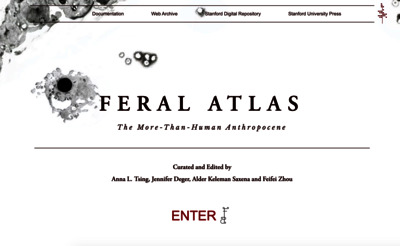Feral atlas: the more-than-human Anthropocene
Tsing, Anna L., Deger, Jennifer, Keleman Saxena, Alder, and Zhou, Feifei (2020) Feral atlas: the more-than-human Anthropocene. [Creative Work]
![[img]](https://researchonline.jcu.edu.au/64639/2.hassmallThumbnailVersion/Screen%20Shot%202021-01-28%20at%2012.46.21%20pm.png)
|
Image (PNG)
- Cover Image
Download (399kB) | Preview |
|
|
Video (QuickTime)
- Published Version
Download (121MB) |
Abstract
Every event in human history has been a more-than-human event. When hunter-gatherers burn the land, they cooperate with herbs that seed quickly and grasses that sprout after fires, attracting game. Inside us, intestinal bacteria make it possible for us to digest our food. Other things, living and nonliving, make it possible to be human. Yet powerful habits of thought over the last centuries have made this statement less than obvious. With the arrival of the idea of the Anthropocene, we move away from such thinking to reconsider how human and nonhuman histories are inextricably intertwined
Research Statement
| Research Background | The idea of the Anthropocene has demanded a reconsideration of how human and nonhuman histories are inextricably intertwined. Feral Atlas interrogates a number of critical research questions within this wider project. How do we tell the terrible ecological stories of our times (Haraway; Tsing, A., Bubandt, N., Gan, E. & Swanson)? How might new forms of mapping provide new ways of apprehending the Anthropocene and the processes that shape it (Latour; Tsing)? What can be learned by studying human infrastructure projects from more-than-human perspectives? Why should the digital humanities reach beyond computational analysis to offer new forms of collective and aesthetically-orientated scholarship (McPherson)? |
|---|---|
| Research Contribution | Feral Atlas offers an original analysis of the Anthropocene and the imperial and industrial projects that have pushed ecological worlds towards devastating tipping points over the past 500 years. Through a series of field reports, it documents the “feral dynamics” created when nonhuman entities become tangled up with human infrastructure projects. Developing the concept and practice of “flow maps”, while refusing the mastering logics of a single map or perspective, the Atlas demonstrates the “patchy” and multi-scalar ecological transformations of the Anthropocene. Custom designed, and interactive, the Atlas features a series of original essays by the curatorial team, 79 field reports by leading scientists, artists, humanists and social scientists, and a further series of commissioned essays, films, and artworks. Illustrated feral entities, from cane toads to radioactive blueberries and forest pathogens, lead users through the site. With its digital form and transdisciplinary reach, Feral Atlas models vital new forms of collective thinking and knowledge production. |
| Research Significance | Published as an Open Access digital publication by the prestigious Stanford University Press, Feral Atlas features original contributions by high-profile artists, humanists and scientists such as Amitav Ghosh, Elizabeth Fenn, Simon Lewis, Mark Maslin, and many others. It been been recognised for its “playful, political and poetical" exploration of "global issues of political and climate justice,” with its selection as no.15 on ArtReview's top 100 influencers on the contemporary art world for 2020. |
| Item ID: | 64639 |
| Item Type: | Creative Work (Recorded/Rendered Work - Digital Creative Work - NTRO) |
| Media of Output: | website |
| ISBN: | 978-1-5036-1504-5 |
| Copyright Information: | © 2020 Stanford University Press |
| Funders: | Danish National Research Foundation (DNRF), James Cook University (JCU), Aarhus University (AU), Aarhus Universitet Forskningsfond, University of California, Santa Cruz, Royal College of Art |
| Date Deposited: | 28 Jan 2021 05:42 |
| FoR Codes: | 44 HUMAN SOCIETY > 4401 Anthropology > 440104 Environmental anthropology @ 50% 44 HUMAN SOCIETY > 4401 Anthropology > 440107 Social and cultural anthropology @ 50% |
| SEO Codes: | 95 CULTURAL UNDERSTANDING > 9503 Heritage > 950399 Heritage not elsewhere classified @ 50% 95 CULTURAL UNDERSTANDING > 9599 Other Cultural Understanding > 959999 Cultural Understanding not elsewhere classified @ 50% |
| Downloads: |
Total: 251 Last 12 Months: 12 |
| More Statistics |



